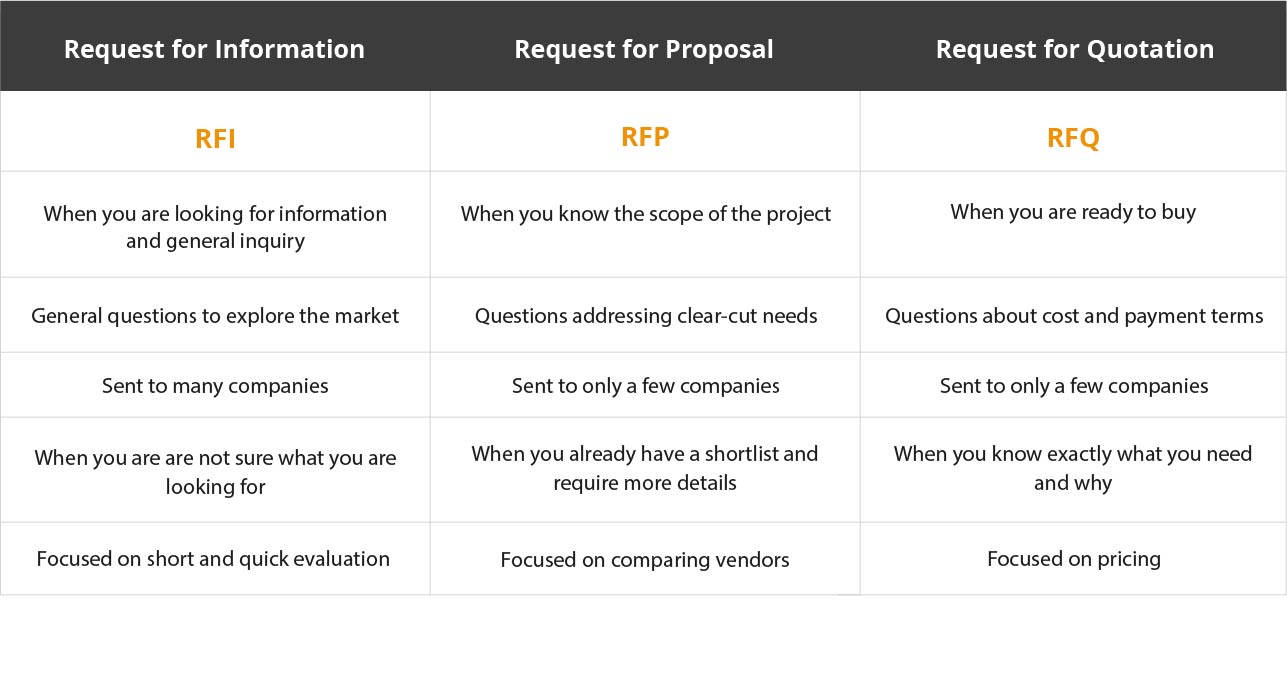
What is the difference between RFI, RFP and RFQ?
Taking on software development projects can be a huge challenge. It involves considering things like designing the user interface and user experience, managing budgets and resources, assembling technology stack, understanding and designing product requirements, schedule and more.
One of the ways businesses make the process easier and more efficient is by outsourcing the project or some of its parts.
Small startups, as well as large enterprises, often choose to outsource some of their software development projects to organisations that have dedicated teams in order to achieve their goal as soon as possible and within a stipulated budget.
There are several issues to be taken care of when businesses consider outsourcing software development projects though. Before signing a contract, the assessment of potential outsourcing suppliers should be done carefully and it should take into account a number of different aspects, for example, capabilities, experience, infrastructure, location, etc.
How to prepare for outsourcing a software development project?
It is paramount for the project to make sure you are provided with all the necessary details to best evaluate potential IT suppliers. In order to do that, some critical questions need to be answered first.
This process can be made easier thanks to request for information (RFI), request for proposal (RFP) and request for quotation (RFQ) which will help you check whether your potential software development partner has what it takes to successfully deliver your project.
However, each of these documents has a very distinct purpose and serves to answer different questions. Let’s take a closer look at them.
What is RFI?
A request for information (RFI) is a standard business procedure used to gather basic information about the experience and skills of software development companies you’d like to work with.
A well-written RFI will help you make the process of evaluating your potential suppliers time and cost-efficient and will help you ensure that what they offer is aligned with the needs of your business.
In order to do that, you may find an RFI template for software development useful. It is usually a concise 3-to-5 page document that provides an executive summary of what is to be outsourced, along with details on each vendor’s field of expertise, quality of software development team, portfolio, etc.
Such a template will help you gather all the required information in a formal and structured manner to make an informed decision.
RFI does not suggest any type of commitment, it is rather an expression of interest that can be followed by an RFP.
What is RFP?
A request for proposal (RFP) is often a follow-up after the RFI. It includes a more detailed description of your company’s needs and business goals. Its main purpose is to help you select the best IT company.
This kind of document gives vendors all the specific information necessary to develop a software solution, based on the actual requirements which will become the project’s baseline. While the RFI is aimed at initially exploring the marketplace, RFP can address clear-cut needs and help both sides understand each other better.
One again, a well-prepared RFP template is crucial when encountering the decision-making process. It makes it easier for you and your potential software development partner to create a long-term business relationship and meet your expectations.
The more effective the RFP is in providing all the necessary details, the more effective the final selection process will be.
What is RFQ?
A request for quotation (RFQ) is a request for the price of the specific software solution. In order to send it to potential vendors, you need to have a detailed list o requirements and predetermined specification ready. Once you know the exact type of product you need, suppliers can submit a price quote and bid on the chance to fulfil certain tasks or projects.
In addition to pricing, RFQ may include details such as payment terms, submission deadline etc. Since RFQ is incredibly specific, organisations issuing it are typically committed to making a purchase. This, however, usually comes after comparing and analysing the RFQ responses for negotiation benchmarking advantage.
Why do we need these documents in the IT world?
The RFI, RFP and RFQ mean a lot in the world of IT outsourcing, where business partners need to collaborate while facing the challenge of geographical disparity, language barriers, time-differences etc. These documents can determine the success or failure of your project. When well-constructed they have a positive effect and can improve further collaboration.
Before sending any of the above-mentioned documents, it’s good to have a non-disclosure agreement (NDA) as an essential security measure when entering negotiations with a software outsourcing vendor, as well as during the IT project itself.
RFI vs RFQ vs RFP – what are the differences?
Outsourcing software development is without a doubt a difficult and complex task, there are myriad details to take into consideration when deciding to do so. RFIs, RFQs, and RFPs are tools that can help in the process, providing you with the information necessary not only to choose the best IT provider but also to get a good deal that will meet your business needs.





